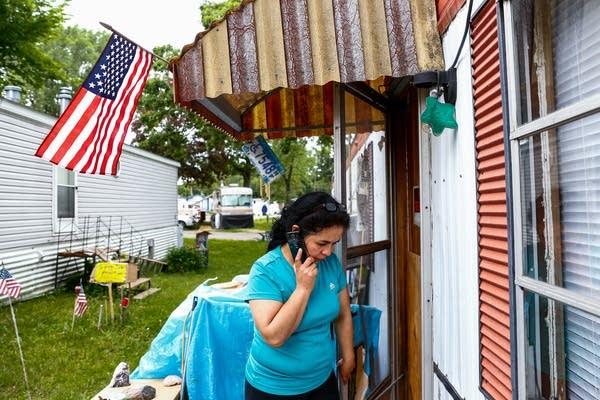The importance of mobile homes as affordable housing

Go Deeper.
Create an account or log in to save stories.
Like this?
Thanks for liking this story! We have added it to a list of your favorite stories.
Bring up the topic of affordable housing and most people will instantly think of apartments — everything from public housing high rises to rising rents in sprawling complexes. But there's a key source of affordable housing around the state that often gets left out of the conversation: manufactured homes.
Mobile home parks, according to Freya Thamman, a planning analyst at the Metropolitan Council, are a "really significant form of affordable housing for some of the most economically disadvantaged residents" in the region.
Thamman joined MPR News host Tom Weber to discuss the Met Council's recent report on manufactured housing.
The report examines the critical role these parks play in the housing market. But for as important a resource as the parks are, they are also endangered: In the past 25 years, the report said, no new parks have been built, but ten have closed.
Turn Up Your Support
MPR News helps you turn down the noise and build shared understanding. Turn up your support for this public resource and keep trusted journalism accessible to all.
These closures disproportionately affect residents of color in Minnesota. According to the report, 25 percent of manufactured home residents in the region are Latino, while Latinos make up just 6 percent of the region's population as a whole.
Park closures are also challenging for families with children. The region's mobile home parks are largely located in high-performing school districts. The Met Council's report showed that 8,400 students live in parks, and 87 percent of park residents are in a school district that performs above the regional average. Finding similarly priced housing in the same districts can be nearly impossible when parks close.
One park facing closure is Lowry Grove in St. Anthony, Minn. The park's situation speaks to the realities of the Met Council's report: A third of the park is Latino, and it's located in the St. Anthony-New Brighton school district, which has one of the best high schools in the state, according to U.S. News & World Report.
Antonia Alvarez, a resident of Lowry Grove and the co-founder of Asamblea de Derechos Civiles, also joined the conversation to share her perspective on life in the park and what she stands to lose if it is closed.
The fate of Lowry Grove has been up in the air since April, when residents were notified that the park would be sold and redeveloped. That sale was finalized in June, despite residents' attempt to purchase the park themselves, exercising their right of first refusal under state law.
The Lowry Grove case is headed to court at the end of this month, so residents are still waiting for a decision.
Mobile home park residents, Alvarez said, do face stigma. There are endless stereotypes about who lives in a mobile home park, and derogatory nicknames like "trailer trash." But that's not the reality, Alvarez said.
"I don't live in a trailer," she said. "I live in a home."
For the full discussion on the realities of living in a mobile home park, and the role they play in the affordable housing market, use the audio player above.


